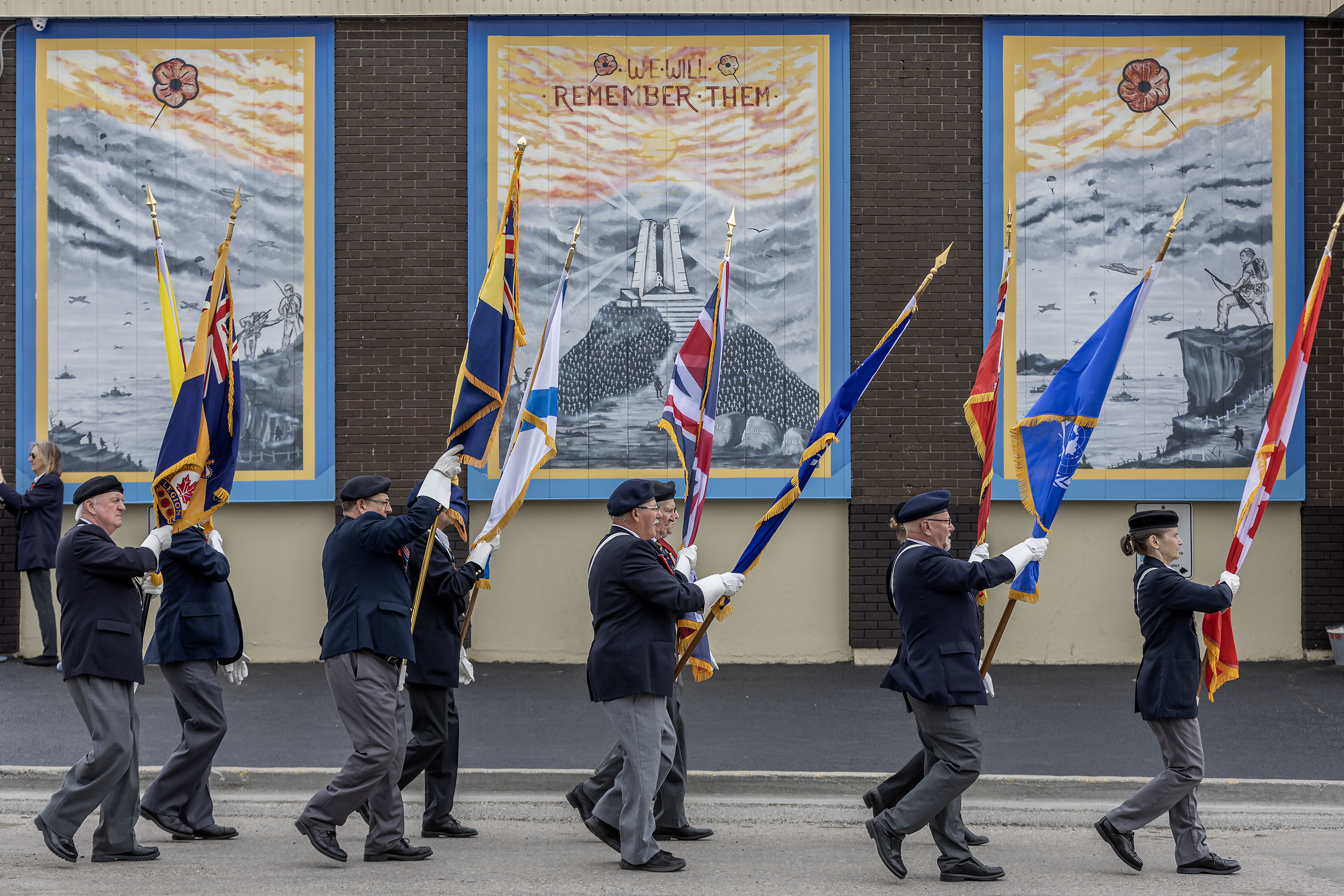
A Legion colour party leads a pre-convention parade past the Ashby Branch in Sydney, N.S., on May 21, 2023. Former command president Marion Fryday-Cook delivered a stern message on the evolving issue of equity, diversity and inclusion with the national service organization. [Stephen J. Thorne/LM]
Marion Fryday-Cook was Nova Scotia/Nunavut Command president from 2019 through 2021. She’s now a member of the Legion’s national committee on equity, diversity and inclusion. She didn’t mince words when presenting a report on the organization’s draft plan to address what some consider the Legion’s single-biggest challenge.
“We’re moving into a new world,” Fryday-Cook said before an all-white convention audience in Sydney, N.S. “Somebody once said, we’re all volunteers and the Legion sometimes tends to eat its own and go after its own.
“It’s time, as members of The Royal Canadian Legion, we soften our thoughts; we are kind to each other; we look out for each other; and we look out for the veterans and their families in our communities, regardless of our biases.
“Time to throw those out the window. We are all Canadians. We are all human beings. We all deserve the dignity and the respect that we want from others.”
The highly respected Fryday-Cook, the second woman to serve as president in the command, got a warm, if not rousing, round of applause for her efforts.
Legion membership has been on the decline for years as its traditional core aged. Its rolls, which numbered 604,000 in 1984, had dropped to less than 250,000 by 2022 when it rose 3.8 per cent, its first increase in three decades.
Yet, as with society at large, old ideas still prevail in some places and the Legion has resolved to address them.
In 2021, the Going Forward Committee, charged with developing a strategic plan for the RCL through 2026, raised the issue of inclusivity in the near-century-old organization.
Operation Harmony, aiming to promote a welcoming environment for all at Legions big and small across the country, was formed in September 2021 to address issues surrounding equity, diversity and inclusion (EDI).
“If we don’t take these steps and do it expeditiously, there won’t be anyone to pass the torch to.”
The committee’s draft strategic plan was approved by the Dominion Executive Council in April. It is now developing a draft action plan to present to the council in September. If it’s approved, it will go before the Dominion Convention in Saint John, N.B., next year.
“By doing these things that we have to do, we will bring in the next generation,” said council member Trevor Jenvenne. “If we don’t take these steps and do it expeditiously, there won’t be anyone to pass the torch to.”
The nine-page draft plan notes the Legion philosophy that a veteran is a veteran is a veteran “must be clearly understood to include the statement ‘regardless of age, ethnicity, race, nationality, disability, economic status, gender identity, sex and sexual orientation.’”
“If we accept this supposition,” it says, “we will give all veterans and non-veterans alike a clear indication that they will be supported and served by the Royal Canadian Legion regardless of their association with any equity-deserving group.”
The document acknowledges that, while the RCL has become increasingly diverse, it “has failed to keep pace,” largely due to challenges attracting younger, post-Cold War veterans and other potential members from racialized and LGBTQ+ communities.
Once an exclusively ex-military organization, veterans and their families still made up about 75 per cent of Legion membership in 2020, according to the organization’s website. Its core principles remain unchanged: service and remembrance.
The annual poppy drive raises about $20 million for veterans—buying hospital beds and equipment, providing meals and home services, and supplementing the costs of such things as heating, housing, clothing, medicine and medical appliances.
It has advocated on veterans’ behalf since it was founded as The Canadian Legion of the British Empire Service League in Winnipeg in 1925. It was a voice for First World War veterans and helped win them pension and disability benefits.
It remains at the forefront of the continuing struggle for veterans’ rights, including those of the RCMP, and their families.
“We as the younger veterans now are really the ones who are most important going forward.”
An RCMP veteran, a member of the Métis Nation and president of the Legion’s operational stress injury (OSI) special section, Jenvenne employed some tough talk when discussing inclusion with the council in Ottawa: Embrace EDI or die, he said.
He told them that the organization’s leadership cannot be afraid to alienate some older or intransigent members if it is to move forward and attract new generations.
“Those ones who feel alienated [by the EDI initiative] are not the ones we need in our organization. We don’t,” emphasized Jenvenne, one of an estimated 23,000 Indigenous veterans in Canada. “We as the younger veterans now are really the ones who are most important going forward.
“I hate to say it, but those individuals who are going to block this won’t be around when I’m here 30 years down the road.”
Jenvenne described how he donned his air force uniform and put his hair in a traditional braid for a branch veterans’ dinner in Alberta. He said three different individuals “decided it would be appropriate to tug on my braid” over the course of the evening.
“There is a problem,” he said, citing first his identity as an Indigenous person and, second, as an OSI sufferer. “I was triggered. I was triggered for days.”
Grand President Larry Murray, who chairs the Op Harmony committee, told the council its guidance has already played a significant role in the Legion’s recent successful recruitment initiatives.
The committee met with special advisers, hired a consultancy, and spoke to members and veterans. The consultancy sent out 99,000 emails to members who had provided addresses; 8,881 responded. It held three virtual town halls, conducted focus groups and consulted other veterans’ organizations worldwide, including the Royal British Legion.
Advertisement



















